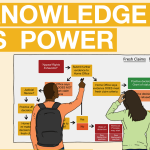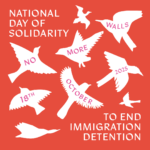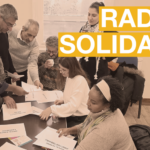
On 28 March 2023, Right to Remain attended an event organised by Ubuntu, in Glasgow. Ubuntu is a charity and shelter which provides unconditional practical support for destitute women and people of other marginalised genders. They support those who have no recourse to public funds or other insecure immigration status.
This event was the last of a series of workshops on ‘Becoming Stronger than the Hostile Environment’.
In Ubuntu’s warm and inviting office in Glasgow, we gathered to hear from different speakers about their experiences navigating the hostile environment. One speaker shared her experience of studying as an asylum seeker. She spoke of the value she had gained in studying for qualifications which would help her when she was granted asylum and was allowed to work.
She emphasised that your immigration status doesn’t change who you are. You are still the same person, whether you have leave to remain or not.
Another speaker shared her experience of taking ownership over her legal case after being sent a questionnaire as part of the streamlined asylum process. After contacting the Home Office directly, she learnt that the questionnaire had been sent to an old address, after her solicitor failed to update her new address.
Leah, our Legal Education Officer based in Glasgow, then introduced Right to Remain and These Walls Must Fall. She explained our guiding ethos that everyone has the right to leave, and the right to remain, wherever they need to be. We spoke about our focus on understanding the system, so that we can fight it. Crucially, our work isn’t about telling you things, it’s about showing you how to understand the system and the hostile environment and how to take practical steps at every stage.
At Right to Remain, we want to build our confidence to provide community legal support to each other. We spoke about how people in the room already have the power to take practical steps to be in a better position and to overcome elements of the hostile environment.
How to use the Toolkit
Our first activity was designed to introduce everyone to the Toolkit, as well as our Young Asylum Guide and Asylum Navigation Board.
Our new flyers have QR codes which lead you directly to the Toolkit. All participants were given a Right to Remain flyer, and we went through key pages of the Toolkit together as a group.
We then focussed on the ACTION SECTION of the Toolkit, which provides information about practical steps you can take at each stage of the process. We also showed our YouTube page where core videos are available in many languages.
Legal Advice vs Legal Support
We then worked together to complete an exercise on the difference between legal advice and legal support.
Legal advice is the application of legal rules to a specific set of facts that proposes action, and can only be given by individuals who are accredited by OISC or the Law Society. In contrast, legal support is taking action without giving legal advice, and includes passing on general legal information, as well as providing emotional, moral and practical support through the process. Legal support is something we can all be doing to support one another.
To test our understanding, we discussed 5 scenarios in turn and grouped them into either ‘legal advice’ or ‘legal support’. This exercise prompted lively discussion and disagreement! The group proposed amendments to the scenarios which would change the action from being legal advice to legal support.
Understanding the distinction between legal advice and legal support is so important as there are fewer lawyers available to advise people on how to navigate these issues. There have been cuts to legal aid, and lawyers who are working in the field are often over stretched and cannot respond to the demand. We know the problem is going to continue, and there will not be an influx of immigration and asylum lawyers overnight, so we need to take power into our own hands.
After we had completed these exercises, we spoke about the substantive interview and how to prepare. We discussed practicing for your substantive interview with a friend – they can pretend to be the Home Office caseworker and ask you questions about your claim. It is also important to prepare for the fact that the Home Office caseworkers might not believe you. A participant who had arrived in the UK at the age of 15 told us that she wished someone had told her then that the Home Office does not necessarily believe you: ‘this information would have helped me so much’. She described the process of claiming asylum as a game of football, you and the Home Office are on very different sides.
Devon Toolkit Festival
The 28 March was a busy day for the Right to Remain team, as our Legal Education Officer Yumna and Engagement Officer Esther were hosting the Toolkit Festival in Devon, as part of a series of events to celebrate 10 years of the Toolkit.
A participant at the Devon Toolkit festival gave us the following feedback on the Toolkit:
‘It’s the most amazing and clear resource for information – and a powerful contester of the confusion fertilised by the shameful, cruel Government strategies.’
Read all about our Toolkit festivals, and stay updated about our next location here.
The Toolkit Festival event in Devon allowed us to catch a glimpse of the incredible solidarity work already happening in the community. We heard about how groups in Devon set up signposting and information sharing groups, to link asylum seekers to practical support in their areas. These groups support people seeking asylum in many ways; from supplementing hotel food with fresh fruit to sharing invaluable legal support resources with people that need it.
Both the Devon Toolkit Festival event and the Ubuntu workshop highlighted the power we already have. We can all take steps to fight the hostile environment, using the Toolkit as a guide.













Discussion: